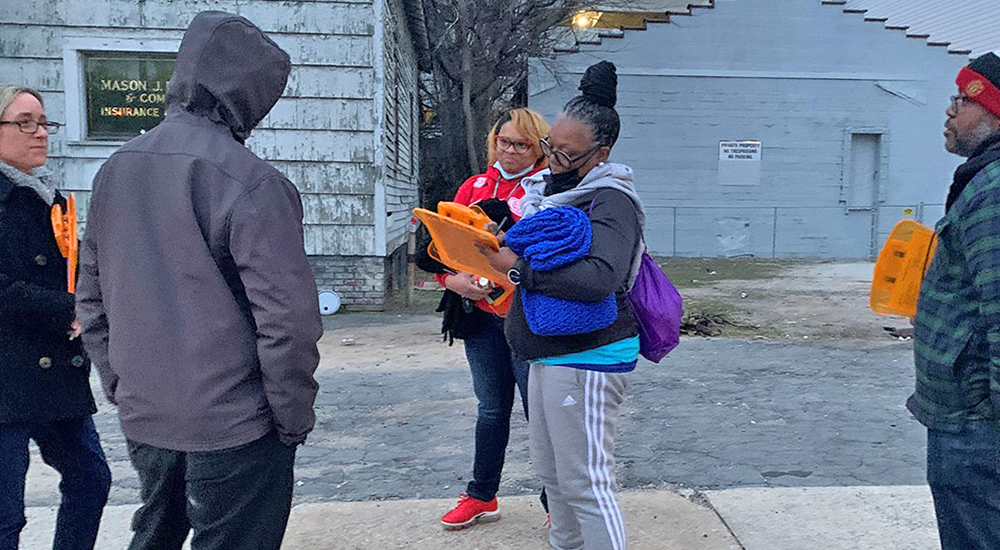Birmingham VA and its community partners were recently recognized for the successful permanent housing placement of 227 Veterans in 2022.
To support VA’s goal of housing 38,000 homeless Veterans nationally, Birmingham’s objective was to place 190 homeless Veterans into housing. The placement of 227 homeless Veterans represents 119% of the targeted goal.
“No Veteran should be without a place to call home,” said Ahmad Brewer, Homeless Veterans coordinator. “Regardless of the reason they may find themselves in their current situation, our homeless program staff are committed to ending homelessness among our nation’s heroes.”
Permanent housing placements provided by VA staff and community partners included apartments or houses that Veterans could rent or own, often with a subsidy to help make the housing more affordable. VA staff also helped some Veterans end their homelessness by reuniting them with family and friends.
Once housed, VA then provides the Veteran the wraparound support services they need to stay housed, including health care, job training, legal and educational assistance and more.
“Birmingham VA Homeless Program staff are truly dedicated.”
All of these efforts are built on the “Housing First” approach which prioritizes getting a Veteran into housing. It then provides the Veteran the wraparound support services they need to stay housed, including health care, job training, legal and educational assistance and more.
“Birmingham VA Homeless Program staff are truly dedicated and guided by the principle that when Veterans have a place to call home, they are best able to benefit from the supportive services they need to stay in their homes long-term,” said Dr. Oladipo Kukoyi, Birmingham VA executive director.
The many programs that turned a Veteran’s life around
After leaving the military and going through a divorce, Marine Corps Veteran Kenneth C.’s once-structured lifestyle began to spiral downwards.
His experimenting with drugs led to a 31-year addiction. After no longer being able to maintain a full-time job and having multiple run-ins with law enforcement, he found himself living on the streets of Gadsden, Alabama.
In September 2017, he boarded a one-way transit from Rainbow City to Birmingham and enrolled in Birmingham VA. His frail body weighed a little over 100 pounds.
“I had multiple issues when I arrived in Birmingham,” he said. “I felt depleted in every facet of life: financially, mentally and physically. I had ruined all of my relationships. I had no housing, transportation or employment. I didn’t even have an email address until I enrolled in VA.”
“Past programs didn’t offer the full spectrum of services at Birmingham VA.”
Kenneth was placed in Birmingham VA transitional housing and began treatment for addiction and depression. He gained employment through the Compensated Work Therapy program.
“I would relapse after my drug treatment programs in the past because they didn’t offer the full spectrum of services I received at Birmingham VA,” said Kenneth. “Not only did VA provide me with housing but I received addiction treatment, financial assistance, and a lot of health care services.”
While living in transitional housing, Kenneth also took advantage of VA education assistance. He completed the Virginia College CDL Combination Truck Driver Training, licensing him to operate 53-foot tractor-trailers.
After four years of treatment, Kenneth, now sober, felt he had the tools to step back out on his own. He purchased a home, owns two personal vehicles and a passport. He works as a long-haul truck driver, traveling around the country.
“Wasn’t easy but my homeless care coordinator never gave up on me.”
“Before enrolling in VA, I existed, but I wasn’t living,” said Kenneth. “The Birmingham VA restored a sense of balance to my life. It wasn’t easy, but my homeless services care coordinator never gave up on me.”
Brewer applauds Kenneth for his perseverance and VA for its Veteran-centered approach to care. “Kenneth’s success speaks to the Whole Health and Patient Centered approach to care provided by the Birmingham VA,” Brewer said.
In late January, Dr. Kukoyi and Victoria Corvin, chief of Social Work Service, and six Health Care for Homeless Veterans staff members participated in the 2023 One Roof Continuum of Care Point-in-Time (PIT) Count for downtown Birmingham.
The PIT count is a count of sheltered and unsheltered people experiencing homelessness on a single night in January. The staff members located and surveyed 15 homeless community members and provided them with blankets, snack bags, hygiene kits, hats and gloves.
“It’s important that none of the individuals surveyed by our group were Veterans,” said Kukoyi. “With the combined efforts of our Homeless Veteran program staff and community partners, I am confident we will continue to see measurable reductions in Veteran homelessness in the years to come.”
If you are or know of a Veteran who is homeless or at risk of becoming homeless due to financial hardship, unemployment, addiction, depression, or transition from jail, contact the National Call Center for Homeless Veterans at 1-877-4AID VET (877-424-3838).
Topics in this story
More Stories
Bob Jesse Award celebrates the achievements of a VA employee and a team or department that exemplifies innovative practices within VA.
The Medical Foster Home program offers Veterans an alternative to nursing homes.
Watch the Under Secretary for Health and a panel of experts discuss VA Health Connect tele-emergency care.








